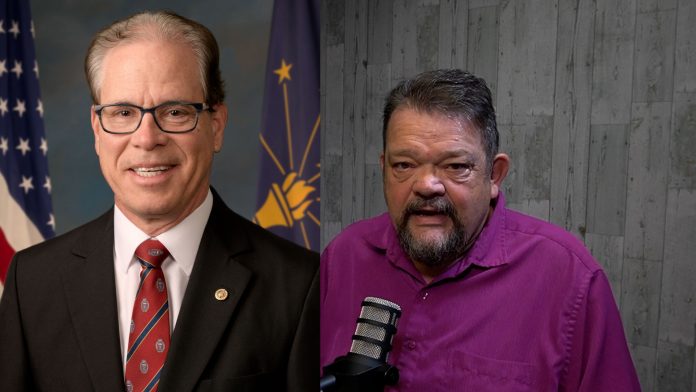|
|||||||||||||||||||||||||||||||||||||||||||||||||||||||||||
HOT JOBS
USI to waive application fee September 22-27
In conjunction with the College GO! campaign sponsored by the Indiana Commission for Higher Education, the University of Southern Indiana invites Indiana students to submit their undergraduate admission applications for free, Sunday through Friday, September 22-27.
“The college application is the first step for students to ignite their journeys, and we’re thrilled to participate in the College GO! campaign and support Indiana students who wish to continue their academic pursuits at the University of Southern Indiana,” says Troy Miller, Vice President for Strategic Enrollment Management.
Prospective undergraduate Indiana students should apply at USI.edu/apply by midnight Friday, September 27 to ensure the fee is waived. In addition to consideration for acceptance, applicants will also receive consideration for merit-based scholarships.
Learn More Indiana’s College GO! campaign seeks to provide resources to Indiana teachers, counselors and students to help plan for education beyond high school. For more information about the College GO! campaign, visit www.LearnMoreIndiana.org/college. To apply, visit USI.edu/apply.
Hunter Hayes at the Jasper Arts Center on Saturday, September 28th
Jasper Community Arts is pleased to present Hunter Hayes at the Jasper Arts Center on Saturday, September 28th. Please see the attached media release for further details.
PLATINUM-SELLING MULTI-INSTRUMENTALIST HUNTER HAYES ANNOUNCES LOST & FOUND
NEW EP REVISITS AND REIMAGINES SONGS IN THE ACCLAIMED SINGER-SONGWRITER’S CATALOG OF HITS
FIRST TRACK, “IN A SONG,” DUE SEPTEMBER 20
PRE-ORDER/PRE-SAVE/PRE-ADD HERE
EPD DAILY ACTIVITY REPORT
FOOTNOTE: EPD DAILY ACTIVITY REPORT information was provided by the EPD and posted by the City-County-County Observer without opinion, bias, or editing.
CITY-COUNTY OBSERVER “MOLES” EXCITED ABOUT UPCOMING “ANNUAL COMMUNITY SERVICE AWARDS” LUNCHEON”
CITY-COUNTY OBSERVER “MOLES” ARE EXCITED ABOUT UPCOMING “COMMUNITY SERVICE AWARDS”LUNCHEON”
EVENT IS COMPLETELY SOLD OUT
SEPTEMBER 19, 2024
When the City-County Observer was created 20-plus years ago an interesting phenomenon happened. Â After we published our first newspaper we started receiving several non-solicited news tips from several civic-minded individuals who were interested in our mission of encouraging “Good Public Policy.”
In appreciation of our past and present newsworthy contributors (MOLES). Today our contributors are 179 strong. Â We designed a fun and creative award named in honor of our valuable news contributions which we present to individuals honored at our “Annual Community Service Award Luncheon.” Â To say the least, the “MOLES” awards have become a highlight at our awards ceremony.

PHOTO: The 2024 EDITION OF THE CITY-COUNTY OBSERVER “MOLE TROPHIES” ARE READY TO BE PRESENTED TO OUR 2023 “COMMUNITY SERVICE AWARD” WINNERS
QUICK BACKGROUND LESSON ABOUT OUR “MOLES”
We originally called our newsworthy contributors “MOLES.” Â Some people called them by different names such as rats, finks, traitors, snitches, and a variety of other non-printable names. So that we could give them a more sophisticated title we recently renamed them “Newsworthy Contributors.”
From day one, we pledged that we would never let anyone know the identity of any of our anonymous “Newsworthy Contributors” We are proud to say that we have kept this pledge and shall continue to do so. Â In fact, the only person who has direct knowledge or contact with our “Newsworthy Contributors” is the CCO Publisher and you can rest assured that the list of our anonymous “Newsworthy Contributors” remains safe in his possession in life or his passing.
Our “Newsworthy Contributors” were originally called “MOLES, “ mainly from local City and County government employees. Â Today they come from all walks of life regardless of race, color, creed, economic and educational background, or political, religious, or sexual persuasions. ÂCurrently, we have 173 anonymous “Newsworthy Contributors.”
The History and Implications of Taxing Unrealized Capital Gains
The History and Implications of Taxing Unrealized Capital Gains
by JOE Wallace
AUGUST 26, 2024
Introduction
Taxation of unrealized capital gains, the practice of taxing the increase in value of assets before they are sold, has been a subject of significant debate. While the concept of taxing these gains may seem like a logical approach to ensuring that wealthier individuals pay a “fair share” of taxes, its implementation has historically been fraught with economic challenges. This article delves into the history of taxing unrealized capital gains, particularly in European nations during the 1970s and 1980s, exploring specific examples, the outcomes of these policies, and the potential consequences if such policies were to be reintroduced today.
Historical Context and Examples
The idea of taxing unrealized capital gains gained traction in several European countries during the economic turbulence of the 1970s and 1980s. Governments were grappling with high inflation, economic stagnation, and widening income inequality. In response, they sought to increase tax revenues by targeting the wealthy, who often held significant portions of their wealth in appreciating assets like real estate and stocks.
One notable example is Sweden, which in the late 1970s introduced a tax on unrealized capital gains as part of broader tax reforms aimed at curbing inflation and promoting economic equality. The policy was designed to tax the paper profits of assets that had increased in value, even if the asset holders had not realized those gains by selling the assets. However, the policy quickly encountered significant challenges.
The Swedish experience revealed that taxing unrealized gains created severe liquidity problems for asset holders, particularly those with non-liquid assets such as real estate. Many taxpayers found themselves in the paradoxical situation of owing taxes on wealth that they could not access without selling their assets. This led to a chilling effect on investment, as individuals and businesses became wary of acquiring or holding onto assets that could expose them to substantial tax liabilities without a corresponding increase in cash flow. By the early 1980s, the policy had been repealed due to its adverse effects on investment and economic growth.
Another example can be found in Germany, where a similar approach was attempted in the 1980s. The German government sought to tax unrealized capital gains as part of a broader effort to stabilize the economy and reduce income inequality. However, the policy faced widespread opposition from the business community and was criticized for its complexity and potential to distort investment decisions. The administrative burden of assessing and collecting taxes on unrealized gains proved to be enormous, leading to significant inefficiencies in the tax system. The policy was ultimately abandoned, as the economic malaise it caused outweighed any potential benefits.
Outcomes and Lessons Learned
The experiences of Sweden, Germany, and other countries that experimented with taxing unrealized capital gains offer important lessons. First and foremost, such policies tend to create liquidity issues for taxpayers, forcing them to sell assets prematurely or take on debt to cover tax liabilities. This can lead to a decrease in overall investment, as individuals and businesses become more cautious in their financial decisions.
Moreover, the administrative complexity of taxing unrealized gains cannot be understated. Accurately assessing the value of assets, particularly those that do not have a readily available market price, is a daunting task. This can lead to disputes between taxpayers and tax authorities, as well as increased costs for both the government and the private sector.
Another critical outcome is the potential for economic distortion. When taxpayers are penalized for holding onto appreciating assets, they may be incentivized to engage in inefficient financial behavior, such as selling assets before they are ready or shifting their investments to avoid the tax altogether. This can lead to misallocation of resources and reduced economic growth.
Conclusion
The historical attempts to tax unrealized capital gains in countries like Sweden and Germany serve as cautionary tales. While the goal of increasing tax revenues and promoting economic equality is laudable, the unintended consequences of such policies can be severe. The liquidity issues, administrative burdens, and economic distortions that arise from taxing unrealized gains have repeatedly proven to outweigh the potential benefits.
If a nation were to reintroduce a tax on unrealized capital gains today, it would likely face similar challenges. Policymakers would need to carefully consider the potential impact on investment, economic growth, and the overall efficiency of the tax system. While the idea of taxing unrealized gains may appeal to those seeking to reduce wealth inequality, history suggests that the practical difficulties and economic risks associated with such a policy make it a less-than-ideal solution.
In conclusion, the history of taxing unrealized capital gains demonstrates the importance of balancing the desire for increased tax revenue with the need to maintain a healthy, functioning economy. Should any nation consider implementing such a policy in the future, it would be wise to learn from past experiences and approach the idea with caution, ensuring that the potential consequences are fully understood and addressed.
EVSC Ask For Assistabe to Help With Growing Population OF Haitian, Marshallese, and Spanish Students
Greetings Community Partners and Friends,
We are excited to be gearing up for the new school year!
To support our growing population of MLL students and families, we are asking for your support next week.
REQUEST: If you are an individual or organization who is bi-lingual or multilingual or provides these supports, we would love your help with translation/interpreting.
Our top three languages are Haitian Creole, Marshallese, and Spanish. We have 50 plus nationalities, so we are not limiting additional languages.
FOOTNOTE: This e-mail was sent out to Community Partners, Friends, and other interested supporters of EVSC. Reliable sources tell us there are approximately 1,400 Haitian, Marshallese, and Spanish students enrolled in EVSC.










